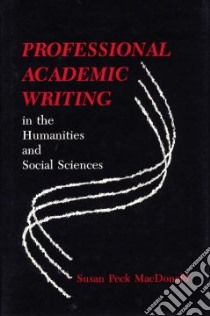Professional Academic Writing in the Humanities and Social Sciences - 9780809319305
Un libro in lingua di MacDonald Susan Peck edito da Baker & Taylor, 1994
- € 34.40
- Il prezzo è variabile in funzione del cambio della valuta d’origine
In this highly original new book, Susan Peck MacDonald tackles important and often controversial contemporary questions regarding the rhetoric of inquiry, the social construction of knowledge, and the professionialization of the academy. In examining the various ways professional writing reveals and constructs disciplinary knowledge, she illuminates not only the social and professional uses of academic language and jargon but also the differences in methodology, values, and ethos between the social sciences and the humanities.
MacDonald's main argument is that the academy has devoted more effort to analyzing theory and method than to analyzing its own texts. Professional texts need further attention because they not only create but are also shaped by the knowledge that is special to each disciplinary field. Her assumption is that knowledge making is the distinctive activity of the academy at the professional level; for that reason, it is important to examine differences in the ways the professional texts of subdisciplinary communities focus on and consolidate knowledge within their fields.
MacDonald's examination concentrates on three sample subdisciplinary fields: attachment research in psychology, Colonial New England social history, and Renaissance New Historicism in literary studies. By tracing, over a period of two decades, how members of each field have discussed a problem in their professional discourse, MacDonald explores whether they have progressed toward a greater resolution of their problems. In her examination of attachment research, she traces the field's progress from its theoretical origins through its discovery of a method to a point of greater conceptual elaboration and agreement. Similarly, in Colonial New England social history, MacDonald examines debates over the values of narrative and analysis and, in Renaissance New Historicism, discusses particularist tendencies and ways in which New historicist articles are organized by anecdotes and narratives.
MacDonald goes on to discuss sentence-level patterns, boldly proposing a method for examining how disciplinary differences in knowledge making are created and reflected at the sentence level. Throughout her work, MacDonald stresses her conviction that academics need to do a better job of explaining their text-making axioms, clarifying their expectations of students at all levels, and monitoring their own professional practices. Beyond that, students must learn not only what the conventions are but also why and how they are used to shape and communicate the knowledge of a discipline through investigation and argument. MacDonald's proposals for both textual and sentence-level analysis will help academic professionals better understand how they might improve communication within their professional communities and with their students.
This book is an invaluable resource for specialists in writing across the curriculum, as well as for other scholars, teachers, and students in the field of rhetoric and composition and individuals in the disciplines of psychology, history, and literature.
Informazioni bibliografiche
- Titolo del Libro in lingua: Professional Academic Writing in the Humanities and Social Sciences
- Lingua: English
- Autore: MacDonald Susan Peck
- Editore: Baker & Taylor
- Collana: (Hardcover)
- Data di Pubblicazione: 29 Gennaio '94
- Genere: LANGUAGE ARTS and DISCIPLINES
- Argomenti : Authorship Humanities literature Authorship Social sciences Authorship
- Pagine: 239
- Dimensioni mm: 222 x 152 x 19
- ISBN-10: 0809319306
- EAN-13: 9780809319305


